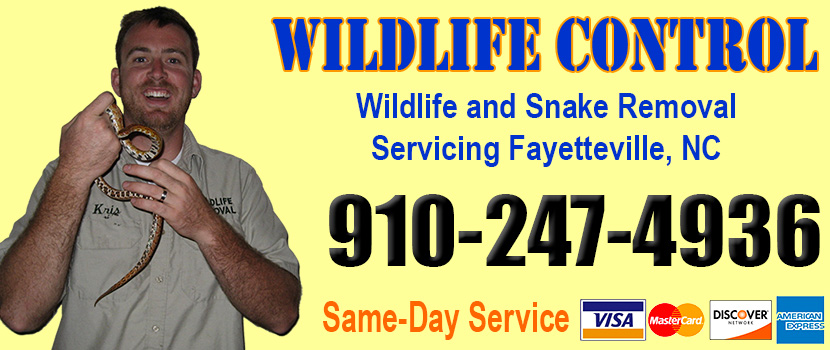
Welcome to fayettevillesnakes.com! I am David, a snake enthusiast living in Fayetteville, NC. Many people don't know that Fayetteville is in fact full of snakes! You just need to know where to find them - they can often be shy and elusive. Some North Carolina snake species are more common outside of the city limits, in different parts of Cumberland County NC, but many types of snakes are indeed common in the more urban parts of Fayetteville. This guide is meant to help educate you about the beautiful snakes of Fayetteville, and to help you identify the most common snakes of Fayetteville, as well as the venomous snakes of Fayetteville that you should learn to recognize and avoid. If you want more detail, click here for my complete list of ALL snake species in Fayetteville. Remember the following:
- Most snakes of Fayetteville are harmless and don't want to encounter you
- Venomous snakes exist but are uncommon in Fayetteville, North Carolina
- Snakes eat rats and mice and are a valuable part of the North Carolina ecosystem
- Never kill a snake - if you leave a snake alone, it will leave you alone.
Common Snake Species in Fayetteville
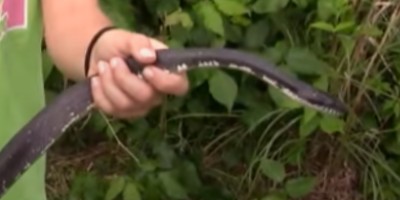 Black Rat Snake:
Black rat snakes are some of the largest snakes you might encounter. Despite that, they’re nonvenomous and generally harmless. These snakes can grow up to be pretty big, with some adults being over seven feet long. You can identify these snakes by their black bodies and white chins. Black rat snakes prefer to live in areas with lots of vegetation. As a result, they’re frequently found in forests, woodlands, fields, and even in farms. These snakes are actually drawn to farms because of the abundance of rats and mice found there. These small rodents make up a large portion of the snake’s diet, hence why it’s called a rat snake. Despite this, the black rat snake also hunts birds and amphibians.
Black Rat Snake:
Black rat snakes are some of the largest snakes you might encounter. Despite that, they’re nonvenomous and generally harmless. These snakes can grow up to be pretty big, with some adults being over seven feet long. You can identify these snakes by their black bodies and white chins. Black rat snakes prefer to live in areas with lots of vegetation. As a result, they’re frequently found in forests, woodlands, fields, and even in farms. These snakes are actually drawn to farms because of the abundance of rats and mice found there. These small rodents make up a large portion of the snake’s diet, hence why it’s called a rat snake. Despite this, the black rat snake also hunts birds and amphibians.
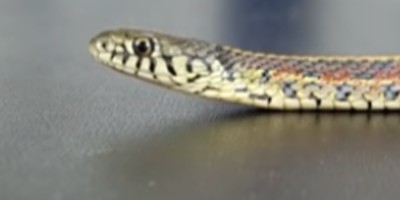 Garter Snake:
Garter snakes are some of the most common snakes in North America, and they’re completely harmless. These snakes are small to medium-sized, with most being around two to three feet long. You can spot these snakes by their unique skin pattern. Their bodies are typically dark, and they have three yellow or white stripes running down their backs. These snakes also have a white or yellow chin. Garter snakes are very abundant, so you’ll be able to find them just about anywhere. You might spot them in a densely vegetated forest, in a swamp, or even in your own backyard. These snakes earn the nickname “garden snake” because of how often they end up in people’s gardens. While there, they’re known to hunt small insects, worms, and slugs. They’re also known to hunt fish and amphibians when out in the wild.
Garter Snake:
Garter snakes are some of the most common snakes in North America, and they’re completely harmless. These snakes are small to medium-sized, with most being around two to three feet long. You can spot these snakes by their unique skin pattern. Their bodies are typically dark, and they have three yellow or white stripes running down their backs. These snakes also have a white or yellow chin. Garter snakes are very abundant, so you’ll be able to find them just about anywhere. You might spot them in a densely vegetated forest, in a swamp, or even in your own backyard. These snakes earn the nickname “garden snake” because of how often they end up in people’s gardens. While there, they’re known to hunt small insects, worms, and slugs. They’re also known to hunt fish and amphibians when out in the wild.
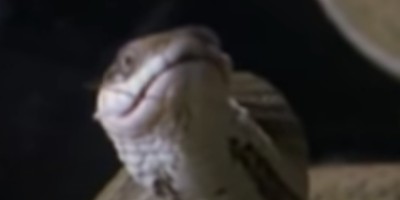 Queen Snake:
Despite the grandeur of their name, queen snakes are small, nonvenomous snakes. In fact, queen snakes are typically only two feet in size. You can tell a queen snake apart from other species, thanks to its olive or brown colored body. These snakes have three thin black stripes running across their backs, and they similarly have four dark stripes on their yellowish-white bellies. Queen snakes are water snakes, so they spend most of their lives in and around bodies of water. As a result, you’re likely to spot them near rivers and lakes. Unlike most snakes who have a varied diet, the queen snake feeds almost exclusively on the crayfish found in and around its habitat.
Queen Snake:
Despite the grandeur of their name, queen snakes are small, nonvenomous snakes. In fact, queen snakes are typically only two feet in size. You can tell a queen snake apart from other species, thanks to its olive or brown colored body. These snakes have three thin black stripes running across their backs, and they similarly have four dark stripes on their yellowish-white bellies. Queen snakes are water snakes, so they spend most of their lives in and around bodies of water. As a result, you’re likely to spot them near rivers and lakes. Unlike most snakes who have a varied diet, the queen snake feeds almost exclusively on the crayfish found in and around its habitat.
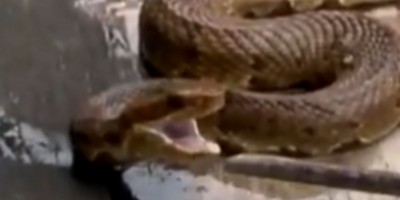 Cottonmouth:
Cottonmouths are one of the most commonly found venomous snakes in the United States. These snakes are three feet long on average. You can tell a cottonmouth apart from other snakes by its light brown body that’s marked with dark brown patches. These markings tend to have a white or cream-colored outline. Cottonmouths are also known as water moccasins, so they tend to live in areas with lots of water. As a result, they’re known to hunt and prey on aquatic animals, like fish and amphibians. Despite this, they sometimes prey on birds, lizards, and even other snakes.
Cottonmouth:
Cottonmouths are one of the most commonly found venomous snakes in the United States. These snakes are three feet long on average. You can tell a cottonmouth apart from other snakes by its light brown body that’s marked with dark brown patches. These markings tend to have a white or cream-colored outline. Cottonmouths are also known as water moccasins, so they tend to live in areas with lots of water. As a result, they’re known to hunt and prey on aquatic animals, like fish and amphibians. Despite this, they sometimes prey on birds, lizards, and even other snakes.
Venomous Snake Species in Fayetteville
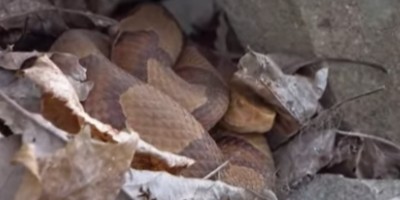 Copperhead:
Copperheads are another commonly found venomous snake. These tend to be two or three feet in size. These reptiles get their names from their orange or golden body. They also have hour-glass shaped brown markings all over them. Copperheads live in a variety of habitats, like forests and swamps. They mainly hunt rats and other rodents, but will also go after birds and amphibians when the opportunity presents itself.
Copperhead:
Copperheads are another commonly found venomous snake. These tend to be two or three feet in size. These reptiles get their names from their orange or golden body. They also have hour-glass shaped brown markings all over them. Copperheads live in a variety of habitats, like forests and swamps. They mainly hunt rats and other rodents, but will also go after birds and amphibians when the opportunity presents itself.
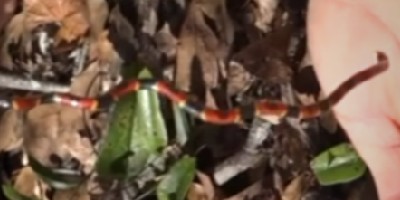 Coral Snake:
Coral snakes are a family of deadly snakes. Their venom is one of the most dangerous in the world. These snakes are small and are typically only one to two feet in size. Yet they’ll always catch your eye because of the brightly colored bands across their bodies. Coral snakes are known to hunt lizards, other snakes, and amphibians.
Coral Snake:
Coral snakes are a family of deadly snakes. Their venom is one of the most dangerous in the world. These snakes are small and are typically only one to two feet in size. Yet they’ll always catch your eye because of the brightly colored bands across their bodies. Coral snakes are known to hunt lizards, other snakes, and amphibians.
If you're unsure, you can email me a photo of the snake at info@fayettevillesnakes.com and I will email you back with the snake's species. If you found a snake skin, read my Found a Skin? page, and you can email me a photo of the skin, and I'll identify the snake for you. If you need professional Fayetteville snake removal help, click my Get Help page, or see the below website sponsor I found, who provides that service.
Remember, the term is not poisonous snakes of Fayetteville, it's venomous snakes of Fayetteville. Poison is generally something you eat, and venom is injected into you. That said, dangerous snakes are very rare in Fayetteville. The few venomous snakes of Cumberland County are rarely seen. But they are commonly misidentified, so learn about all the snake species of Fayetteville in order to correctly identify them. These snakes are usually also found in the surrounding towns of Hope Mills, Fort Bragg, Spring Lake, Linden, Eastover, Stedman, Wade, Godwin, Vander, and the surrounding areas.
Read our article about:
List of Deadliest Snakes in the United States
fayettevillesnakes.com domain and hosting costs made possible by the generous support of this sponsor:
